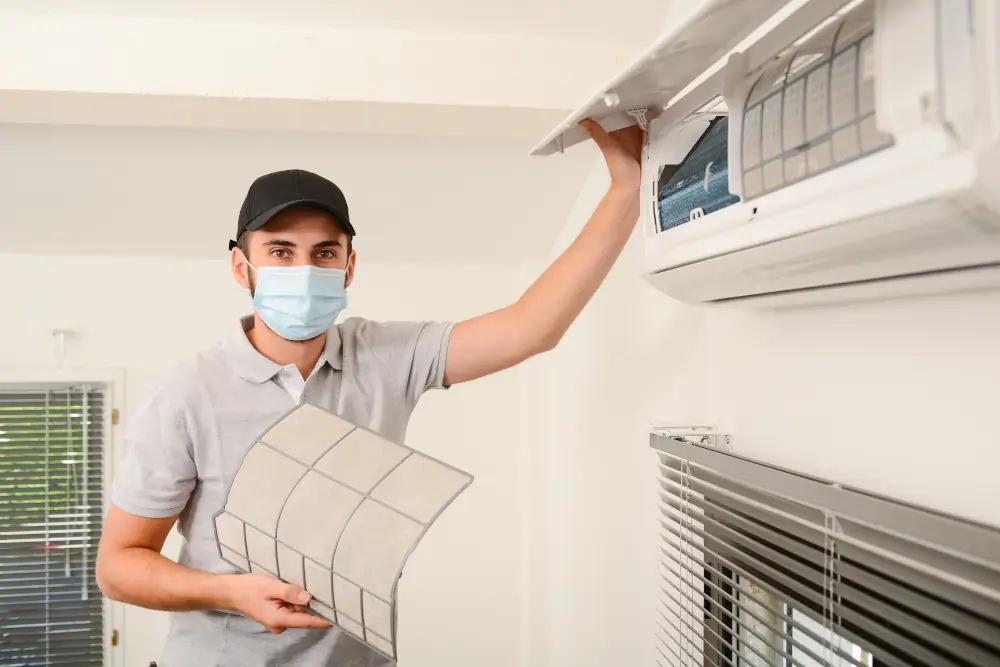Indoor air quality (IAQ) is crucial in maintaining a healthy living and working environment. Poor indoor air quality (IAQ) can cause a range of health problems, including allergies, asthma, respiratory infections, and even chronic conditions. Since we spend a large portion of our time indoors, the air quality in these spaces has a direct impact on our overall health and well-being. One of the most effective ways to improve indoor air quality is by using a properly functioning HVAC in Acton (Heating, Ventilation, and Air Conditioning) system.
This blog will explore how HVAC systems contribute to healthier indoor air quality and offer tips on maximizing their effectiveness for better health outcomes.
What is Indoor Air Quality?
Indoor air quality refers to the condition of the air inside a building, including pollutants, moisture levels, and overall air freshener. Various factors can impact IAQ, including ventilation, harmful gases like carbon dioxide or radon, biological pollutants (mold, bacteria, or dust mites), and particulate matter (e.g., smoke, dust, and soot). Poor indoor air quality is often associated with a range of symptoms, such as headaches, fatigue, dizziness, and irritation of the eyes, nose, or throat.
How HVAC Systems Affect Indoor Air Quality
Proper Ventilation
One of the most essential functions of an HVAC system is providing adequate ventilation. Proper ventilation ensures that fresh outdoor air circulates throughout the building while stale, polluted air is exhausted. Indoor pollutants can accumulate without proper ventilation, causing a decline in air quality.
An HVAC system with a well-maintained ventilation system ensures an optimal exchange of air, removing excess moisture, allergens, and harmful gases. Modern HVAC systems are often equipped with energy recovery ventilators (ERVs) or heat recovery ventilators (HRVs), which bring in fresh air while reducing the energy costs of conditioning that air.
Air Filtration and Purification
One of the most direct ways HVAC systems contribute to better air quality is through air filtration. HVAC units have air filters that trap dust, pollen, pet dander, and other airborne particles that could contribute to respiratory problems. High-efficiency particulate air (HEPA) filters, for example, can trap particles as small as 0.3 microns, which includes most allergens, bacteria, and viruses.
Upgrading to a high-quality air filter is crucial for those with respiratory conditions or sensitivities. Additionally, some HVAC systems have built-in air purifiers that use advanced technologies like UV light or ionization to kill bacteria, viruses, and mold spores, further improving indoor air quality.
Controlling Humidity
Humidity plays a significant role in indoor air quality. Too much moisture can encourage the growth of mold, bacteria, and dust mites, while too little moisture can lead to dry skin, irritated eyes, and respiratory discomfort. HVAC systems are designed to regulate humidity levels in your home or office, ensuring that the air stays within a comfortable and healthy range.
Air conditioning units inherently reduce humidity by cooling the air, but modern HVAC systems often come with humidifiers or dehumidifiers to help maintain ideal moisture levels in the air. This helps prevent the growth of mold and mildew, which thrive in humid environments and promotes better respiratory health.
Controlling Temperature for Comfort
Maintaining an ideal temperature is essential for comfort and air quality. Extreme temperatures can make the air feel stuffy and difficult to breathe, contributing to poor humidity regulation. HVAC systems maintain a consistent temperature, creating an environment conducive to better breathing.
Moreover, temperature control can reduce the proliferation of harmful microorganisms. For example, a room that is too warm can increase the risk of bacterial growth, while frigid temperatures can make indoor air feel dry, irritating the respiratory system. Our HVAC Preston team helps to support overall respiratory health by keeping temperatures comfortable.
Reducing Exposure to VOCs
Volatile organic compounds (VOCs) are chemicals found in paints, cleaning products, and furniture, which can quickly become airborne and affect indoor air quality. HVAC systems can help minimize VOC levels by improving air circulation and filtration. Some HVAC systems have special filters designed to capture VOCs and other harmful gases before they can circulate throughout the building.
Using air purifiers with HVAC systems can help eliminate VOCs, keeping the air cleaner and safer. Additionally, regular maintenance of HVAC systems, such as changing filters and checking for leaks, can reduce the accumulation of VOCs and other pollutants in the air.
Removing Odors and Smoke
Odors from cooking, pets, or smoking can affect the air quality and the overall comfort of indoor spaces. HVAC systems with activated carbon filters or ozone generators can help neutralize and remove odors from the air, providing a more pleasant and healthier indoor environment.
Smoke, particularly from wildfires, can carry harmful particles into the air that may exacerbate respiratory conditions. HVAC systems equipped with HEPA filters or specialized smoke filters can help trap these particles and improve indoor air quality by reducing the amount of smoke circulating in the air.
Benefits of Improved Indoor Air Quality
Reduced Respiratory Issues
A cleaner, more breathable environment can significantly reduce the risk of respiratory problems such as asthma, allergies, and chronic obstructive pulmonary disease (COPD). By filtering out allergens, pollutants, and irritants, HVAC systems help ensure that the air we breathe is free from harmful particles that can trigger these conditions.
Improved Sleep Quality
Poor air quality can disrupt sleep, leading to snoring, congestion, or difficulty breathing at night. By maintaining proper ventilation, temperature, and humidity, HVAC systems create a more comfortable and conducive environment for restful sleep.
Enhanced Productivity and Well-Being
The air quality in workplaces, schools, or healthcare environments can significantly impact individuals’ productivity and well-being. Poor IAQ can lead to discomfort, distraction, and even long-term health issues that affect workers and students. A well-functioning HVAC system optimizes air quality for better focus, concentration, and overall health.
How to Maintain Your HVAC System for Optimal Air Quality
- Change Filters Regularly: Filters should be replaced at least every 3 months or more frequently if you have pets or have allergies. Upgrading to HEPA filters can also improve air quality.
- Clean Air Ducts: Over time, dust and debris can accumulate in your air ducts. Cleaning them periodically will ensure that these pollutants aren’t being circulated into your living or working space.
- Schedule Annual Inspections: Inspecting your HVAC system by a professional can help identify any issues that could compromise air quality, such as leaks or inefficient components.
- Use Humidifiers or Dehumidifiers: If your HVAC system doesn’t have a built-in humidity control system, consider using standalone humidifiers or dehumidifiers to maintain optimal moisture levels in the air.
- Ventilate Properly: Make sure that your HVAC system is ventilating correctly. Ensure that air intakes and exhausts are unobstructed, and consider using ERVs or HRVs for additional ventilation.
Conclusion
HVAC systems are vital in maintaining healthier indoor air quality by providing ventilation, controlling humidity, filtering pollutants, and regulating temperature. Whether in homes, offices, or healthcare facilities, a properly functioning HVAC system contributes significantly to the overall well-being of occupants by reducing exposure to allergens, harmful gases, and pollutants. Regular maintenance and upgrading of your HVAC system with advanced air filtration and purification technologies can enhance indoor air quality, promoting better health, productivity, and comfort.






